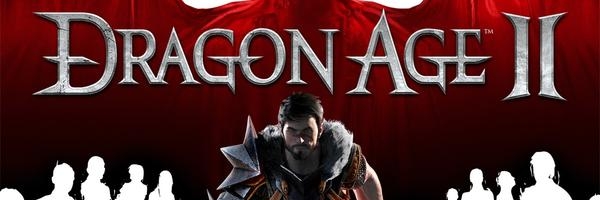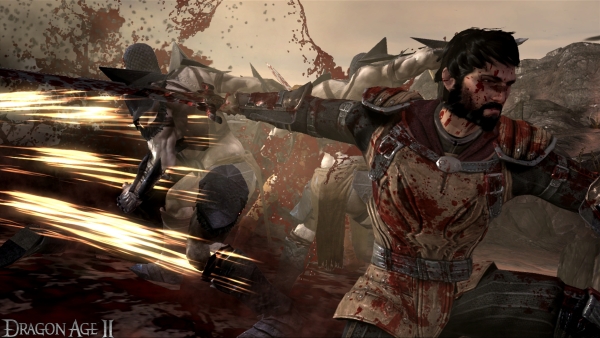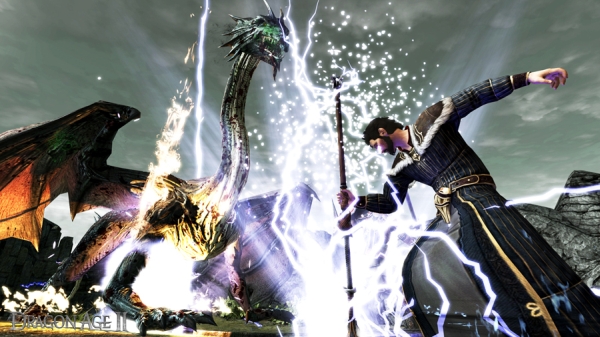
Though it was greatly overshadowed by Mass Effect 2, Dragon Age: Origins was a high-quality return to BioWare’s days as purveyors of epic fantasy RPGs. It had all the qualities that one expects from the company: an epic plot, great characters & dialog, a huge quest that could be solved in numerous ways, and of course, awkward romances. Dragon Age II brings most of this back – just in a far more intimate, narrow setting. While many things about the game are basic refinements of the Dragon Age: Origins formula, the ultimate result is a game that seems like a reinvention of the franchise, similar to the changes from Mass Effect to Mass Effect 2. The question, of course, is whether the risks taken in Dragon Age II have made for a great game… and hey, that’s what we’re here for.
Platform: PC, PS3, Xbox 360 (Version Played)
Publisher: EA
Developer: BioWare
Genre: Rags to Riches Hack & Slash RPG
Release: March 8, 2011
ESRB Rating: Mature
Rather than tell the usual tale of adventurers out to save the world, Dragon Age II dials it back and focuses on a singular person – the eventual Champion of Kirkwall, Hawke. In the beginning, Hawke and his/her (after all, BioWare lets you choose between both genders) family are on the run from Lothering – a city utterly demolished by Darkspawn during the events of Dragon Age: Origins – and ultimately find themselves in Kirkwall, up north in the Free Marches. As time progresses, Hawke becomes more famous and more important, to the point where he becomes the sole “mediator” in a huge dispute that threatens the stability of the entire continent of Thedas. The story is told in flashback mode, as party member Varric is “encouraged” to explain roughly ten years worth of events involving Hawke and company. It’s certainly a risky proposition to make a role-playing game so narrow in scope, but it pays off in that the story feels very different from most RPGs. There’s no epic goal to complete – keeping Kirkwall safe and stable is what Dragon Age II is all about. Like Mass Effect 2, it’s also possible to import a Dragon Age: Origins save. However, because Hawke is not The Warden, it instead fills in the backstory of the world, rather than a specific character. In most respects this is merely window dressing, but there’s a surprising amount of cameos, quests, and random banter based around what happened.
Dragon Age II functions similarly to its predecessor, at least in terms of gameplay progression. While there’s always main quests to tackle, DAII has a seemingly endless array of less vital adventures. More often than not, a single side-quest will spawn off others, and even in these, the choices Hawke make has an effect on the overall story. Even if you pass on doing a quest, it changes how Hawke might be treated later on by those who would have appeared in them. The game does an admirable job of showing the fruits of your labor in many ways, and those fruits can be both small and large. The only downer is so many of these quests take place in caverns, docks, and back alleys – and they all look the same. It reminded me a lot of the limited map design in the original Mass Effect, only in this case it seems even more blatant – at least with Mass Effect you can make the “futuristic prefab buildings” argument. It makes the whole affair seem low budget at times, which is a disservice to the overall quality of the game.

The game also features some very interesting relationships with your party members. Your group of allies come from varying backgrounds, races, and ideals, and the actions you take while they’re in your party greatly affect their opinion of you. With Anders in your party, for instance, it’s wise to side with mages whenever possible if you wish to gain his friendship – otherwise he’ll become a rival. That’s not to say he’ll leave the party and do battle with you, but he becomes less friendly to you. In other circumstances, it’s as simple as how you respond to people – a character like Isabela enjoys smart-asses, so responding in that way gains her favor. Also, almost every party member can be romanced – regardless of your gender. Yes, that might seem a little odd that nearly everyone is bi-sexual, but at least the option is there for all orientations. The only exceptions are Varric, who is too vital to the plot; Aveline, who hasn’t quite learned how to recognize flirting; and DLC character Sebastian who is more interested in the Chantry. Oh, even characters that have gone “rival” with you can still engage in a relationship – yes, torrid, hateful love is the best love.
While Dragon Age: Origins was a turn-based throwback to the old days of the Computer RPG, Dragon Age II is much more action-oriented affair. It generally functions the same, and features all the tactical commands from the first game, but now you’re allowed to mash the attack button instead of simply watching the action. In general, it all works well, though on higher difficulties you really have to babysit party members with those tactical commands. It also features some wacky restrictions, such as a “cool down” period after using a health potion. In some fights, not being able to use a health potion at any time is a maddening fight against the clock, especially if you’re being chased by 10 rage demons and a few abominations. Otherwise, the combat is exciting and satisfying, especially if you make use of Hawke’s advanced skills. Like Origins, you can customize all your characters with unique abilities, change their weaponry and accessories, and purchase armor upgrades. Note that Hawke is unable to completely change the armor of party members – they can only purchase or find “upgprades” to their default getup.
In most respects, Dragon Age II tries to meld the complexity of Origins with the kind of streamlining decisions made in Mass Effect 2. It’s still possible to gain a ton of loot, but only Hawke can really use most of it, as mentioned. For most die-hard RPG players this might seem frustrating – especially when you are given free equipment that you can’t even use, if they’re not designed for your character class – but given BioWare’s current mission of making their games accessible to almost everyone, limiting customization to the main character makes sense. At the very least it’s a happy medium, considering Mass Effect 2 had almost none of this. On the other hand, the ridiculous amount of quests of varying import means those looking for a lengthy game will be quite happy, but it’s always possible to blow them all off and focus directly on the main plot. It’ll be a hollow shell of a story without the multitude of choices made in the mini-adventures, but it’ll still tell Hawke’s tale.

The whole “recycled locales” thing has been discussed already here, but I really have to harp on it again – it’s lame. Seeing the same cave or dock for the 20th time gets really dull, even if the enemies within them are different. The recycled environments didn’t work in Mass Effect, and they don’t work here. It’s easier to deal with the whole “one city” thing – after all, two of my favorite games ever take place in a single city similar to Kirkwall – but the dungeons at least should have some more variety. The visuals themselves are nice, but often plain. DA:O was also quite drab, but at least it got by with lengthier, more unique dungeons. The bright spots are in character design – party members and vital NPCs are given a wide array of animations and unique characteristics. Even Hawke looks great if you spend enough time fixing him or her up, rather than using a built-in preset. The characters also speak well – the voice acting is superb. Hawke especially nails it, though admittedly I have a fondness for wise-cracking Hawke.
While it definitely has some issues, Dragon Age II is an enjoyable game that’s designed in a way that you might want to replay it immediately, if only to move the story in a different direction. It’s got almost everything you might want in an RPG – a solid plot, really good characters, polished gameplay, and a wide variety of quests. Though the decision to narrow down the plot and focus on a singular character is risky, it works, and the result is something you’ve likely not see before in the genre. It’s definitely got some issues that make the game seem a little rushed, but somehow the actual quality isn’t harmed by this. So long as you can deal with the repetitive dungeons and the move from turn-based combat, Dragon Age II is a great game that mixes things up quite well. It’ll never be mentioned as a Game of the Year candidate, but it’s definitely $60 well spent.

Review Disclosure: A retail copy of Dragon Age II was purchased by Warp Zoned for the purposes of this review.






